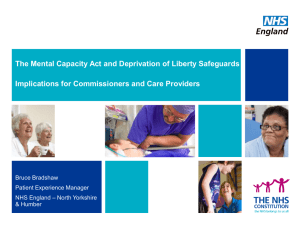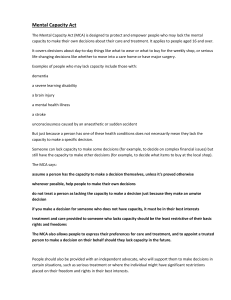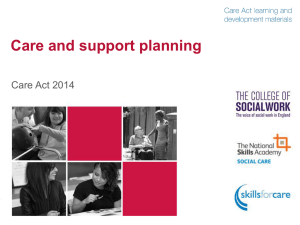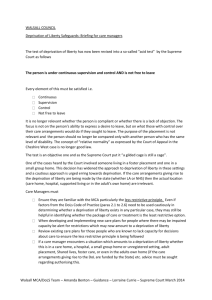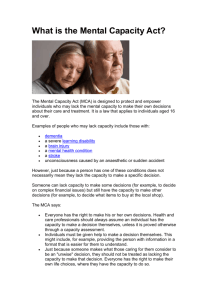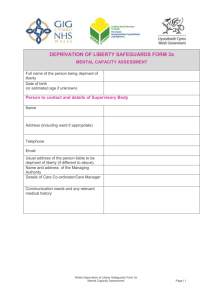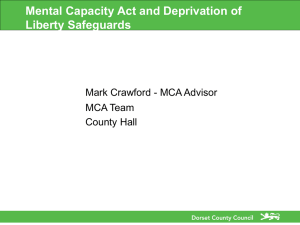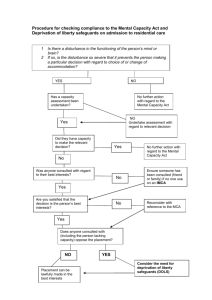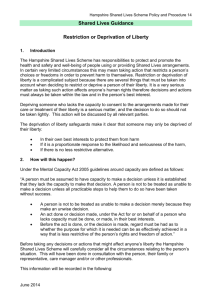The Mental Capacity Act (MCA)
advertisement
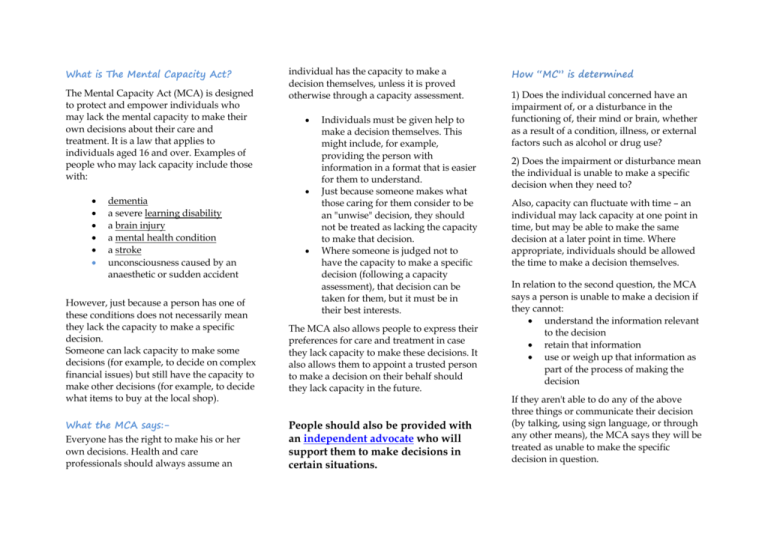
What is The Mental Capacity Act? The Mental Capacity Act (MCA) is designed to protect and empower individuals who may lack the mental capacity to make their own decisions about their care and treatment. It is a law that applies to individuals aged 16 and over. Examples of people who may lack capacity include those with: dementia a severe learning disability a brain injury a mental health condition a stroke unconsciousness caused by an anaesthetic or sudden accident However, just because a person has one of these conditions does not necessarily mean they lack the capacity to make a specific decision. Someone can lack capacity to make some decisions (for example, to decide on complex financial issues) but still have the capacity to make other decisions (for example, to decide what items to buy at the local shop). What the MCA says:Everyone has the right to make his or her own decisions. Health and care professionals should always assume an individual has the capacity to make a decision themselves, unless it is proved otherwise through a capacity assessment. Individuals must be given help to make a decision themselves. This might include, for example, providing the person with information in a format that is easier for them to understand. Just because someone makes what those caring for them consider to be an "unwise" decision, they should not be treated as lacking the capacity to make that decision. Where someone is judged not to have the capacity to make a specific decision (following a capacity assessment), that decision can be taken for them, but it must be in their best interests. The MCA also allows people to express their preferences for care and treatment in case they lack capacity to make these decisions. It also allows them to appoint a trusted person to make a decision on their behalf should they lack capacity in the future. People should also be provided with an independent advocate who will support them to make decisions in certain situations. How “MC” is determined 1) Does the individual concerned have an impairment of, or a disturbance in the functioning of, their mind or brain, whether as a result of a condition, illness, or external factors such as alcohol or drug use? 2) Does the impairment or disturbance mean the individual is unable to make a specific decision when they need to? Also, capacity can fluctuate with time – an individual may lack capacity at one point in time, but may be able to make the same decision at a later point in time. Where appropriate, individuals should be allowed the time to make a decision themselves. In relation to the second question, the MCA says a person is unable to make a decision if they cannot: understand the information relevant to the decision retain that information use or weigh up that information as part of the process of making the decision If they aren't able to do any of the above three things or communicate their decision (by talking, using sign language, or through any other means), the MCA says they will be treated as unable to make the specific decision in question. Supporting decision-making Before deciding an individual lacks capacity to make a particular decision, appropriate steps must be taken to enable them to make the decision themselves. Does the individual have all the relevant information they need? Have they been given information on any alternatives? Could information be explained or presented in a way that is easier to understand (for example, by using simple language or visual aids)? Have different methods of communication been explored? Could anyone else help with communication, such as a family member, carer, or advocate? Are there particular times of day when the individual's understanding is better? Are there particular locations where the individual may feel more at ease? Could the decision be delayed until a time when the individual might be better able to make the decision? Best interest decisions If someone is found to lack the capacity to make a decision and such a decision needs to be made for them, the MCA states the decision must be made in their best interests. People who should be consulted include anyone previously named by the person concerned, anyone engaged in caring for them, close relatives, friends or others who take an interest in their welfare, any attorney appointed under a Lasting Power of Attorney or Enduring Power of Attorney, and any deputy appointed by the Court of Protection to make decisions for the person. Deprivation of Liberty In certain cases, the restrictions placed upon an individual who lacks capacity to consent to the arrangements of their care may amount to "deprivation of liberty". This must be judged on a case-by-case basis. Where it appears a deprivation of liberty might occur, the provider of care (usually a hospital or a care home) has to apply to their local authority, who will then arrange an assessment of the individual's care and treatment to decide if the deprivation of liberty is in the best interests of the individual concerned. If it is, the local authority will grant a legal authorisation. If it is not, the care and treatment package must be changed – otherwise, an unlawful deprivation of liberty will occur. This system is known as the Deprivation of Liberty Safeguards. If you suspect a deprivation of liberty may occur, the first step should be to talk to the care provider and then possibly the local authority. Lordshill Health Centre Mental Capacity Act & Deprivation of Liberty Lordshill District Centre Lordshill, Southampton SO16 8HY 02380 738144
